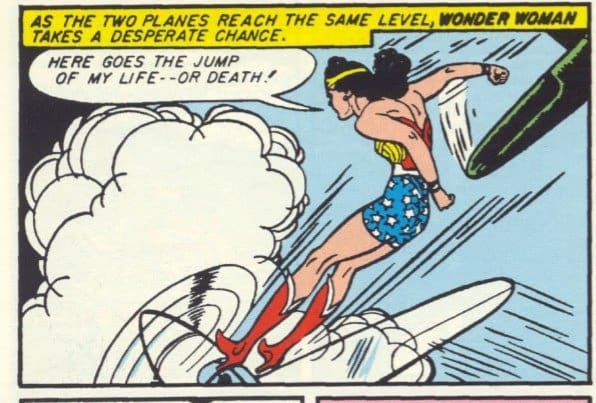Knitting Fiction
Chapter 06: Deborah, Wonder Woman

Deborah changes her mind. She can do that. She has the ability to aim her mind where she chooses. If asked, she’d tell you it’s a gift, like her good head of hair and her showgirl legs. And now she has decided to change her mind. She will stop thinking about Brave New World and breast cancer. Instead, she picks up her brain, and aims it like a gun at her project pattern. For years she has had the electronic version stored in her Ravelry library. Initially, she’d saved it reflexively without conscious thought or intent. Each time she scrolls through her patterns, she momentarily gets hung up on this one. She hesitates a minute. Part of her knows that any sensible knitter would delete it. There must be a dozen reasons not to hold on to this pattern, she thinks. The colors are too attention grabbing for a woman my age. The symbol is nowadays meaningless. It would be a bugger to knit. But another part of her, the unconscious part, puts a hold on her delete finger. And so for seven years she has left it in peace among her dozens of other potential projects.
Deborah downloads the pattern, prints it off and as she is placing it into a plastic sleeve a memory from long ago comes back to her. She sees herself at age six or seven. This was the alone time, before there were sisters. She sees the empty hall and dark oak stairs leading to the upstairs bedrooms. The old farmhouse, a simple structure, nonetheless had secret cubbyholes that only a child could find. One of these was the space under the stairs. Undoubtedly the grownups believed it was empty—filled with nothing. But Deborah knows otherwise, because she’d found an old comic book shoved into a crevice. It was a Wonder Woman comic. Deborah showed it to her mother, who was pleased. They sat on the stairs together as her mother read it to her. Deborah kept the comic in its cubby under the stairs. Sometimes she would take it out and look at the drawings. Sometimes her mother would read it to her while they sat together on the stairs. Deborah’s mother, an artist, would render drawings of Wonder Woman for her.
Deborah sobs. Explosive. Sloppy. Out loud. A cry so intense, it edges on screaming. She scares herself. Disoriented, she looks around to see who is crying. It’s me! She does not want to stop, so she shakes her head and persists. And persists. It takes awhile. When at last the crying has stopped and she is down to heavy breathing, she steps back to look at herself. She can’t remember the last time she cried. Let loose like this. I don’t cry often enough, she thinks. She has long suspected that there is a down side to having a brain she can aim. Her control allows her to build a dam so wide and high not even the Monkey Wrench Gang can crack it. She has not cried once during this whole cancer experience. Last year she did not cry when she was worried about her friend’s health. The year before she did not cry when her well went dry. She did not cry when America turned its back on democracy. When was the last time she cried? The injury of her grandson. That was about five years ago. Deborah understands these tears are not just about the cancer and missing her mother. These tears are about it all. All of it. I’m not going to think about all of it now. I’m going to think only about what cracked the dam, she says to herself.
It’s her beautiful new memory. Her mother reading a comic to her on the back stairs. How could she have forgotten, and for so long? When will I ever be old enough not to need a mother, she wonders. Not yet. Not yet. When in need, some people might wish for God. Some might wish for a miracle. Some might wish for an angel. Deborah wishes for her mother. She wishes the two of them could be sitting on the stairs and paging through the Wonder Woman comic right now.
It’s not just her mother that Deborah misses—it’s the idea of Wonder Woman. Deborah contemplates how that comic changed her. It opened a door in her mind. As a child, she’d not known that women could have physical volition. She’d known that women possessed the magic of making babies. But this magic did not represent power. As a farm girl she knew that pigs and cows and cats all possessed that same magic. In Deborah’s experience, if women had power, it was because it had first been granted by men. The priests, fathers, husbands, and gods sometimes made women feel special and even cherished. As much as, or even more than, a prize bull or family bible, or a hector of good black-land. But power intrinsic onto themselves–Deborah had not known about that kind of power. Before Wonder Woman, such power was a secret outside her ability to imagine. After Wonder Woman she could imagine feats of physical daring. Strong women, making decisions, taking physical risks. Succeeding against all odds. Protecting themselves, protecting others. Taking revenge. Deborah is finished crying. Yes, even women taking revenge.
She sets her sights back on her pattern. With a vengeance she begins to take stock of her project. The pattern calls for gold and red. She knows she will not be able to achieve these same bright shades. That’s because the yarn company that dyed these yarns was dyeing over white. Deborah will be dyeing over the natural golden-brown shade of camel. True, the camel fiber is carded with silk which is just a shade or two off white. Even at 50/50 Deborah’s yarn is a soft shade of tan-gold. This challenge suits her just fine. She judges the colors used in the pattern sample as brighter than she’d like anyway. She plans on not only toning down the colors but taking advantage of the light brown camel undertone. She will use Aztec gold, which ought to be a darker, deeper shade of gold. As for the red, she plans on mixing some grey with scarlet, which with camel undertones will yield a shade reminiscent of a glass of merlot and fine Swiss chocolate. Kettle dye, three skeins at a time. Twist and wrap, remove the wraps early on, and re-soak. She might even decide to add a post-dye speckle. This will work.
The yarn will probably arrive in a week. Wool2dye4 does not dawdle; they understand the urgency of knitters. But it turns out breast cancer surgeons have even a greater sense of urgency. She calculates the yarn will arrive a day or two after her surgery. Can she kettle-dye after having part, or all of her left breast and a good portion of her underarm lymph glands removed? Deborah calculates. She’s probably not going to be able to lift much weight with that arm. But she can compensate by filling and emptying the kettle by the cupful if needed. She probably won’t have much range of motion on that side, but she can compensate with her strong right arm. Yes, according to Deborah’s calculations, she will not need her left breast or lymph nodes to be able to kettle dye. Now that she really thinks about it she does not need her breasts for much of anything anymore. It’s been forty years since her babies were weaned. She concludes she will be able to dye yarn, knit, spin, weave and even work at the yarn shop. Probably even after surgery and during her treatment. As long as I’m upright and above ground, she says to herself.
Deborah calls herself a “Compulsive Overknitter.” She has had one or another type of fiber in her hands since she was a youngster. One grandmother taught her to knit when she was six. Her other grandmother taught her to crochet when she was seven. From her mother she learned to sew at eleven, mend at twelve and embroider at thirteen. By early adolescence Deborah was able to create her own pattern out of newspaper, then use that pattern to sew children’s clothes out of feed-sack cloth. She could repurpose a wool blanket into a winter coat, knit sweaters and socks, and felt wool for use in heavy quilts. Deborah did not just learn the basics, she built on them, combined and embellished them. From her early days she was a gifted fiber artist. Deborah understands that it was the luck of the draw. She imagines her genetic line, hanging strait and taught, like a drop spindle, beginning 12,000 generations ago in the caves of Central Europe. The genes that select for creating art instead of hunting, fucking or sleeping have traveled down through the ages, until they reached her great-grandfather, an intellectual and musician. Then through her grandfather, a photographer and musician. Then through her mother, an artist who painted in oils. Then through herself. Then through her two children, one a cinema artist, the other a musician. Time will tell if the gene will pass through her grandchildren.
Deborah has long wondered how people with the gene choose their mode of expression. Is it determined by what we are exposed to as children? Deborah was exposed to fiber as a child and has chosen it as her medium. Had she, instead, been born into a family whose parents were sculptors, poets, or thespians, then she would have spent her early years embedded in sculpting paraphernalia, or living among stacks of books, with poetry for bed times stories, or directing her grade school playmates on a half size stage built in the basement. But on the other hand, Deborah was also exposed to music, drawing and painting, along with fiber. And it was fiber who’s call she answered. She considers it the luck of the draw. She is grateful. In fact, she is righteous. She knows that sculptures do not keep you warm in winter. She prefers working in a group of like minded fiber artists, instead of within the solitary space of the poet. She understands that the repetitive physical motions of working with fiber serve to quiet and focus the mind in a manner not possible with art forms such as acting. Deborah intends to hold on to her fiber throughout these next difficult months. It is the medium through which she will express herself.
She, once again, changes her mind. She changes her focus to her next step. She has made a list of family and friends, her boss and coworkers, all of whom she will now contact. They have been waiting with her. She will end their waiting with bad news. She will quell the sting of bad news with words of optimism. She will accept their offers to help. Deborah understands that she will need the support of her family and friends. Deborah will also accept the support of her mother. In whatever manner she receives it. Maybe her mother is in heaven and is looking down on her right now? Or maybe there is no afterlife whatsoever and her mother is dead, except for the part that lives in Deborah’s memory and heart. Whoever sent the Wonder Woman memory, whether directly or indirectly, Deborah believes it came from her mother. Not everything is understood. Two and two are not always four. Deborah is not a stranger to magic.
